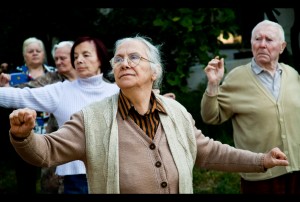
Neuropsychiatric symptoms in dementia are very common (Risco et al., 2015). They can include agitation, wandering, sleeping difficulties, changes in eating patterns, and hallucinations. There are limited treatment options for neuropsychiatric symptoms, but antipsychotics are most often prescribed to reduce symptomatology. A recent European study showed that one third of people with dementia recently admitted into a long-term care facility received antipsychotic medication (de Mauleon et al., 2014). In fact, prescription varied significantly across countries.
The longer-term benefits of antipsychotics are unclear though. That’s because they have been associated with increased cognitive decline, greater occurence of strokes, and death. So, wouldn’t it be better to use non-pharmacological interventions, and focus more on the individual with person-centred care?
In this blog, I am looking at a recent randomised controlled trial by Clive Ballard and colleagues (2015), which investigated the impact of antipsychotic review and nonpharmacological interventions on:
- Antipsychotic use;
- Neuropsychiatric symptoms; and
- Mortality in people with dementia living in nursing homes.
The primary outcomes were antipsychotic use, agitation, and depression. The secondary outcomes were neuropsychiatric symptoms and mortality.

Antipsychotics can help with the neuropsychiatric symptoms of dementia, but they are also associated with a range of serious adverse events.
Methods
The team recruited 16 nursing homes across the UK, all of which were rated as adequate or better in the Care Quality Commission register of 2013. Nursing homes were excluded if fewer than 60% of occupants had dementia. In total, 277 people with dementia took part in the study. Nursing homes were randomly assigned to one, or a combination of the three interventions:
- Eight nursing homes were allocated to antipsychotic review. This focuses on the review of antipsychotic prescriptions by primary care physicians or psychiatrists, and involves the careful assessment of the underlying causes of neuropsychiatric symptoms and the monitoring of the medication. It is always recommended to involve nonpharmacological interventions instead of antipsychotic usage, if considered helpful. The other eight homes received no antipsychotic review.
- Another set of eight nursing homes were allocated to social interaction. This involved raising the time spent doing meaningful activities for at least three times a week. The other eight homes did not receive this intervention.
- Lastly, another set of eight randomly picked nursing homes received an exercise intervention. This involved a personalised exercise plan, and activities such as walking, dancing, and exercise to music. The other eight homes did not receive the intervention.
All homes received training in person-centred care, which raises the understanding of dementia, how the home can be personalised, and recognising the impact of staff-resident relationships, amongst others.
The intervention was delivered by a trained therapist, and at least two trained staff in each home. The intervention(s) last for 9 months, and the researchers conducting the final assessment were blinded to the intervention group allocation.

The nursing homes in this study were randomly assigned to one, or a combination of the three interventions, which were delivered over a 9-month period.
Results
In total, 146 residents received the antipsychotic review at baseline, and 131 residents didn’t. The trial significantly reduced antipsychotic use by 50%, but there were no significant changes to agitation and depression as a result of either intervention, except the interaction of antipsychotic review and exercise on depression.
For mortality, the most effective intervention was a mix of antipsychotic review and social interaction, which reduced mortality in that group down to 19% (compared to 35% in those who received no intervention).
For neuropsychiatric symptoms, receiving antipsychotic review had a worse effect on symptoms than receiving no review. However, there was no disadvantage of antipsychotic review if taken together with the social intervention. Exercise effectively reduced neuropsychiatric symptoms.

This trial suggests that antipsychotic use can be effectively reduced in nursing homes by using a review protocol.
Limitations
Because this study is so well thought-through and incorporates many elements for an evidence-based intervention, I struggle finding many limitations with it. I noted when reading through the random allocation of nursing homes into the interventions, that the resident groups who received the individual mixes of interventions might have been on the smaller side. However, the authors did not include any information on the sample sizes of individual groups, and it is unclear how many were included in the analysis for each group.
Summary
This is a really substantial randomised controlled trial, that takes into account a complex set of interventions. It is great to see that the trial integrated evidence-based interventions, which were based on existing manuals, such as the Seattle protocol for the exercise intervention. This increases the trial credibility and methodological strength.
According to Dr Anne Corbett, a co-investigator on the study:
This study provides clear evidence for the effectiveness of a cheap, practical set of interventions for reducing antipsychotic medication use by dementia patients in nursing homes. Current best practice guidelines for the use of antipsychotic drugs indicate that their long-term use needs to be carefully reviewed, but our results demonstrate the critical importance of ensuring that any reduction or stopping of medication is accompanied by non-drug approaches, particularly social interaction. Reducing the use of these drugs without any other interventions could result in worsening of neuropsychiatric symptoms, which are highly distressing to the person, their carers and loved ones. These findings should prompt an urgent review of guidelines for the use of antipsychotic drugs, to ensure that review of these medicines are in the best interests of people with dementia.
As the authors point out, there needs to be a shift away from solely prescribing antipsychotics to using nonpharmacological interventions also, or, in some cases, as an alternative. Hence, it’s recommended that practice guidelines are changed. Indeed, a shift towards nonpharmacological interventions isn’t specific to antipsychotic prescription only. There are many areas in which nonpharmacological interventions can be effective, such as cognition or everyday functioning (Giebel & Challis, 2015). Plus, with the majority of people with dementia being 65 years or older, and most likely already taking several medications, we should be trying to avoid offering more medication wherever possible. Looking at the interventions offered here also, increasing social activities and physical functioning will have additional benefits to the residents’ well-being and cardiovascular functioning.
Overall, the findings of this study are quite compelling if you just look at the reduced mortality rates. If that doesn’t sway a change in practice guidelines, then what outcome of any study will?

This evidence emphasises that antipsychotic review in people with dementia should be accompanied by a programme of social interaction and activities.
Links
Primary paper
Other references
de Mauleon, A., Sourdet, S., Renom-Guiteras, A., Gillette-Guyonnet, S., Leino-Kilpi, H., Karlsson, S., Bleijlevens, M., Zabalegui, A., Saks, K., Vellas, B., Jolley, D., & Soto, M. (2014). Associated Factors With Antipsychotic Use in Long-Term Institutional Care in Eight European Countries: Results From the RightTimePlaceCare Study. Journal of the American Medical Directors Association, 16(2), 114-119. [PubMed abstract]
Giebel, C.M., & Challis, D. (2015). Translating cognitive and everyday activity deficits into cognitive interventions in mild dementia and mild cognitive impairment. International Journal of Geriatric Psychiatry, 30(1), 21-31. [Abstract]
Risco, E., Cabrera, E., Jolley, D., Stephan, A., Karlsson, S., Verbeek, H., Saks, k., Hupli, M., Sourdet, S., & Zabalegui, A. (2015). The association between physical dependency and the presence of neuropsychiatric symptoms, with the admission of people with dementia to a long-term care institution. International Journal of Nursing Studies, 52(5), 980-987. [PubMed abstract]
Photo credits

RT https://t.co/sVvSnMluEo Reducing antipsychotic use in people with dementia living in nursing homes https://t.co/iFJe5LXoXQ Mental_Elf
Reducing antipsychotic use in people with dementia living in nursing homes https://t.co/le7HykcZQV #MentalHealth https://t.co/6q6wsf4nuX
RT iVivekMisra Reducing antipsychotic use in people with dementia living in nursing homes https://t.co/nyAZQDjq7w… https://t.co/L6CFUPeSv8
RT https://t.co/4xBuDHIKZH Reducing antipsychotic use in people with dementia living in nursing homes https://t.co/xO8TIn4BC3 #MentalHeal…
What lurks behind the 1st December calendar door?My @Mental_Elf blog on antipsychotics in #dementia :) https://t.co/8NKAn5kK6T @MICRA_Ageing
Hi @DrAnneCorbett Tx again for sharing! @ClarissaGiebel’s blog of yr reducing antipsychotic use paper is now live https://t.co/9CMxNYQdag
Antipsychotic use by ppl w dementia in nursing homes can be effectively reduced thru use of a review protocol https://t.co/9CMxNYQdag
@Mental_Elf Frankly if I get dementia I hope they give me plenty of meds so I die quicker.
Reducing anti-psychotic drug treatment in #dementia – https://t.co/jMondJfq6Z
RT @Mental_Elf: RCT: Antipsychotic review in ppl w dementia shld be accompanied by a programme of social interaction & activities https://t…
RT https://t.co/A9HBJivA0Z Reducing anti-psychotic drug treatment in #dementia – https://t.co/PernMU5qKt
Retweeted Blackburn Carers (@BlackburnCarers):
Reducing anti-psychotic drug treatment in #dementia -… https://t.co/48jKJg9orb
RT https://t.co/Kq0b5F3qDQ Retweeted Blackburn Carers (BlackburnCarers):
Reducing anti-psychotic drug treatment … https://t.co/Yeg47NiK7V
RT @DrAnneCorbett: Thanks @Mental_Elf for blogging about our paper on antipsychotic review. Food for thought for dementia prescribers https…
New study shows benefits of nonpharmacological interventions such as social interaction for people with #dementia https://t.co/fW94TwJZhk
Reducing antipsychotic use in people with dementia living in nursing homes https://t.co/OKtIC1vce2
Reducing #antipsychotic use in people with #dementia living in #nursinghomes https://t.co/374nt6OxjG #evidence from an #RCT via @Mental_Elf
Impressive new cluster RCT shows how we can reduce #antipsychotic use in ppl w #dementia living in nursing homes https://t.co/9CMxNYQdag
Study on how to lower the use of antipsychotics in nursing homes.
https://t.co/xZG1r9dDti
RT @ClarissaGiebel: We need to reduce antipsychotic use in #dementia -a new trial shows! https://t.co/8NKAn5kK6T @SABPResearch @nbdem @jean…
RCT finds that antipsychotic review & social interaction reduces mortality in ppl w dementia living in nursing homes https://t.co/9CMxNYQdag
Don’t miss: Antipsychotic use by people wwith dementia in nursing homes can be effectively reduced… https://t.co/9CMxNYQdag #EBP
Reducing antipsychotic use in people with dementia living in nursing homes https://t.co/dKZEVGe7fe via @sharethis
Reducing antipsychotic use in people with dementia living in nursing homes https://t.co/8KXzg4Rxxd via sharethis
RT @ClarissaGiebel: Reducing antipsychotic use in #dementia reduces mortality https://t.co/8NKAn5kK6T @DementiaJournal @BMEdementia @Divers…
Reducing antipsychotic use in people with dementia living in nursing homes – https://t.co/e9wMHkL1He
RT https://t.co/IHDw29NFXM Reducing antipsychotic use in people with dementia living in nursing homes – https://t.co/yb6YDvEbwr HHSLNew
Antipsychotic review & social interaction reduce mortality in ppl w dementia in nursing homes https://t.co/j3tW6JzR2R via @Mental_Elf
[…] Reducing antipsychotic use in people with dementia living in nursing homes […]
[…] Impact of antipsychotic review and non-pharmacological intervention on antipsychotic use, neuropsych… […]